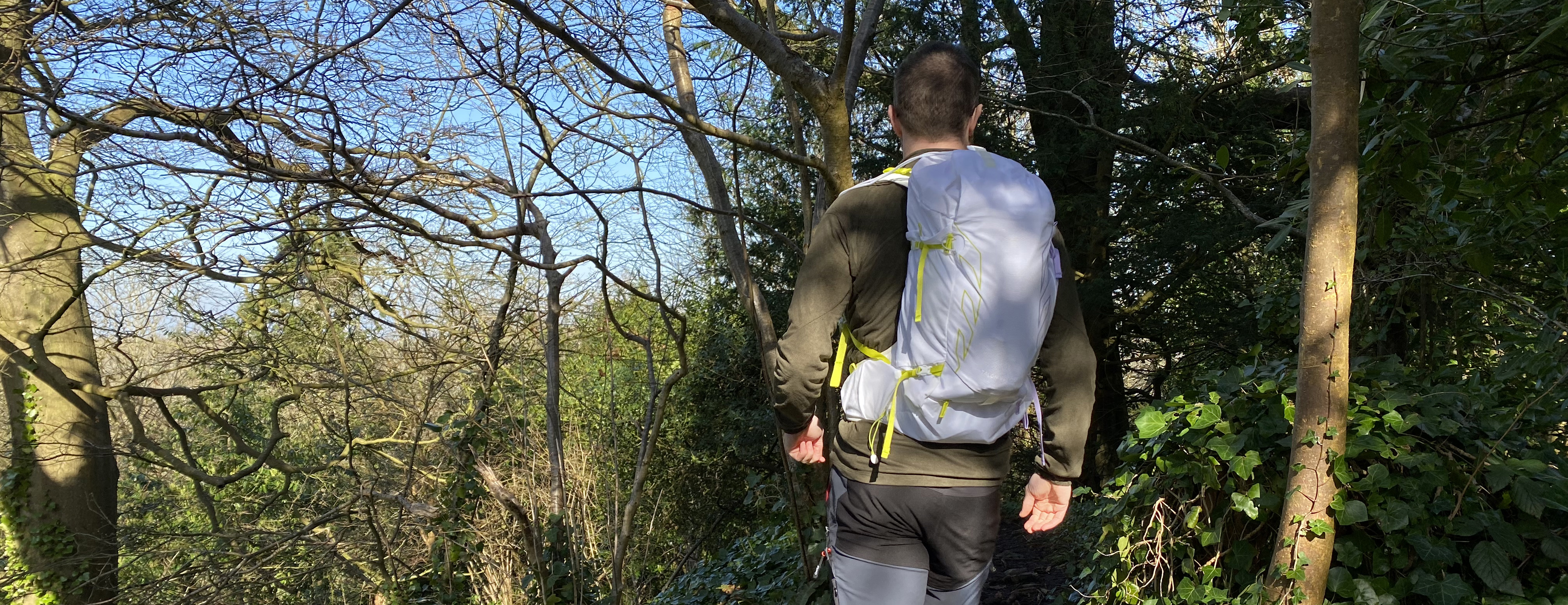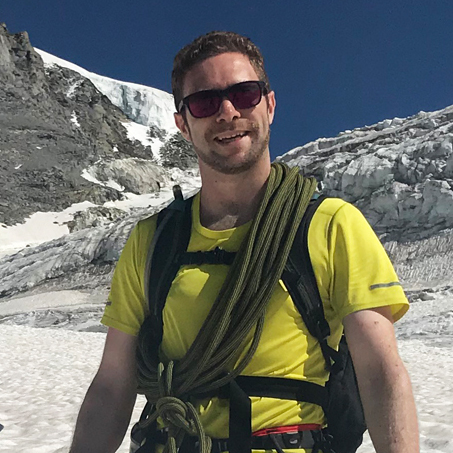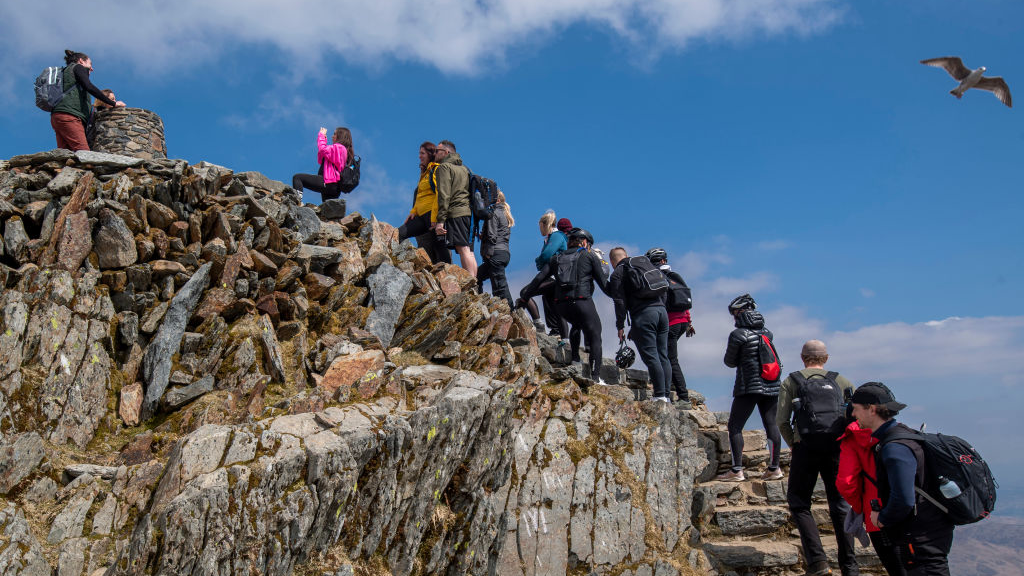Advnture Verdict
Designed with versatility in mind, this is a great little daypack that will please adventure runners, day hikers, peak baggers and many more besides. Osprey’s usual design ingenuity is present throughout and I particularly like the soft flask compatible harness system, which gives quick and easy access to hydration, fuel and a phone while on the trail. Oh, and the nylon it’s made from is Bluesign approved and 100% recycled too.
Pros
- +
Multi-sport versatility
- +
Running vest style harness
- +
Hydration flask holsters
- +
Plenty of storage options
- +
Neat safety whistle on sternum strap
- +
Helmet compatible cinch lid
- +
No waterproof cover
- +
100% recycled fabrics
- +
Bluesign approved
Cons
- -
Soft flasks not included
- -
Not enough capacity for big adventures
- -
Heavier than the standard Talon 22
- -
Limited edition white version will look dirty fast
You can trust Advnture
In the world of outdoor carry and the best hiking backpacks, Osprey needs little introduction. The all-conquering Colorado brand continues to push through innovations in backpack technology, crafting comfortable and multi-functional products with a flair for design ingenuity. It had jaws on the floor its ambitious and futuristic Osprey UNLTD packs, including the excellent UNLTD AirScape 68, in late 2022, cementing its place as a leader in the continued evolution of the modern backpack.
Two of Osprey’s most popular products in their wide range of daypacks are the male Talon and female Tempest packs, with their ventilated AirScape backpanels, comfortable harnesses and multi-sport applications. The Talon and Tempest Velocity packs are designed with running-inspired features, such as a harness system that can carry easy access soft flasks. This enhances their versatility and they appear in both the hiking backpack and running backpack sections of Osprey’s website.
Meet the reviewer
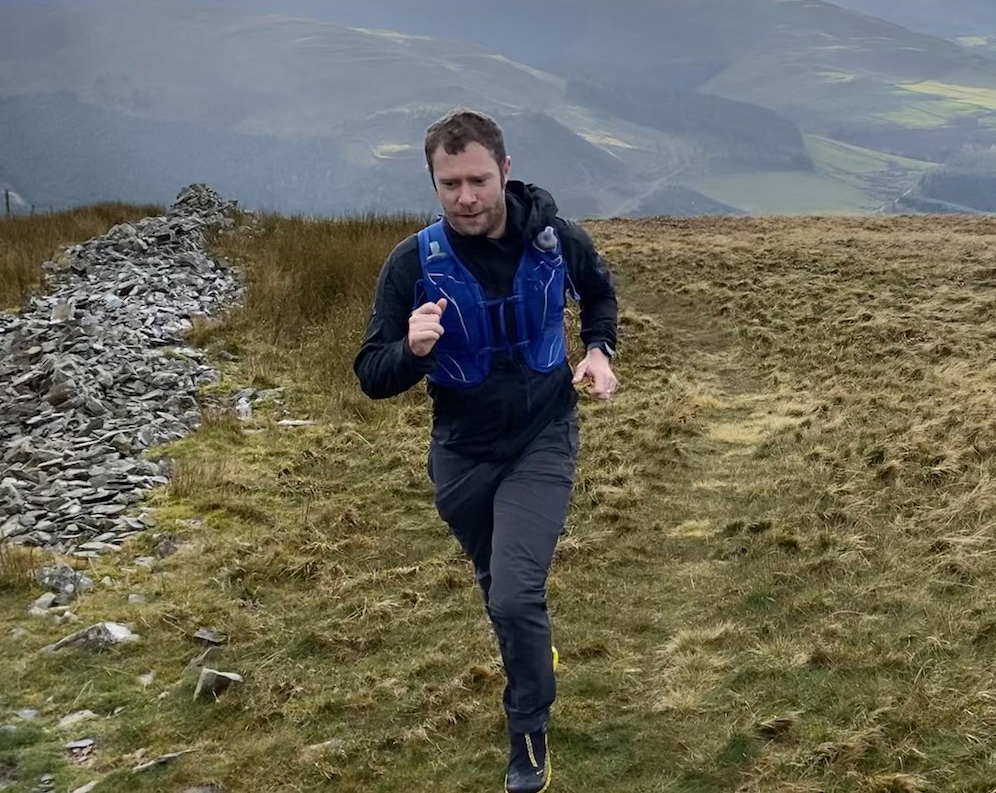
Alex is passionate about exploring the mountains, whether taking it easy on a hike, notching the adrenaline up on a scramble or exploring at speed on a trail run. As someone who has learnt through a long process of trial and error in the mountains, he has steadily refined his nous when it comes to pack organisation. Today, he's a qualified mountain leader and one of Advnture's experts when it comes to backcountry kit.
First impressions
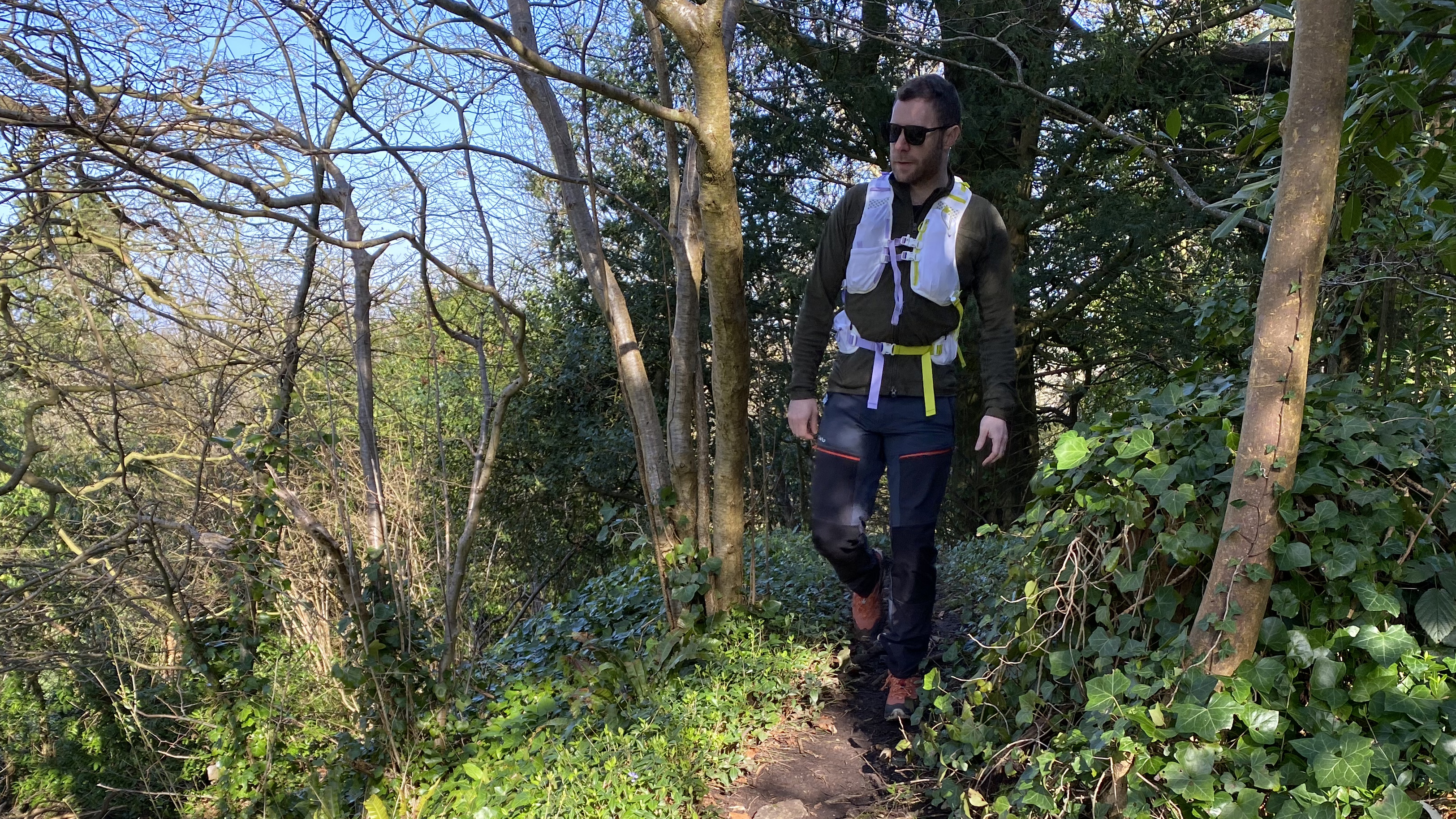
List price: $180 (US) / £150 (UK)
Weight (empty): 867g / 1.91lb
Volume: 20L
Size: 52 x 26 x 26 cm / 20.47” x 10.24” x 10.24” in
Variations available: 20- and 30-liter versions with S/M & M/L options; Women’s Tempest Velocity 20- and 30-liter versions with XS/S & M/L options
Materials: Main: 100D x 210D high-tenacity nylon; Accent: 70D nylon; Bottom: 420D nylon; All 100% recycled, Bluesign approved, and with DWR treatment made without PFAS
Colors: White (limited edition); Dark Charcoal/Tumbleweed Yellow; Matcha Green/Lemongrass
Compatibility: Hiking, trekking, running
Right, this first bit won’t apply to the other colorways, which by all accounts look very smart. I was testing the – admittedly limited edition – white version of the Osprey Talon Velocity 20 backpack, which has lime green straps and detailing on one side and mauve on the other. These are brave choices from Osprey, to say the least. I honestly can’t understand why anyone who’s planning on using this pack for what it’s designed for – ie running, hiking and cycling in the backcountry – would choose a white design that will look dirty almost immediately.
I contacted Osprey about this and the brand clarified that the limited edition pack is intended as a crossover between urban/lifestyle stylings in a technical trail pack. So, if you intend to hike in the backcountry, I’d choose one of the other options. If you fancy the benefits of a technical pack for the city, this could be an good choice. It’s definitely a statement piece – just don’t spill your coffee on it.
Anyway, once I got past the color, I was able to get beneath the skin of this thoughtfully designed pack. Its pedigree as a potential running backpack was immediately apparent and I fetched my Osprey soft flasks right away to fit them into their slots on the harness. Seems a bit of a shame that Osprey didn’t throw a couple of flasks into the overall package as a sweetener! Overall, it seems to strike a nice balance between comfort and minimalism, while it’s obvious that the various mesh pockets and zippered compartments allow for versatile storage.
Fabrics and design
The Talon Velocity is crafted from a cocktail of fully recycled and Bluesign approved nylons, with rugged 420D nylon in its base, high-tenacity 100D x 210D nylon for the main body and 70D nylon elsewhere. For water-resistance, the fabrics have been treated with DWR, which stands for Durable Water Repellency and causes those satisfying water beads to form on the surface, and without harmful “forever chemicals”.
The running-inspired harness system is similar to Osprey’s Duro 6, with an elasticated mesh on either strap for holding a soft flask and a stabilization loop at the top that goes around the neck of the flask. There’s a zippered phone pocket on the left strap, allowing you to have your device quickly to hand during running adventures, and a mesh stow pocket on the right. The chest straps’ buckles are meatier here though, with clever clips for moving them up and down their fabric runners and adjustment straps that enable you to find the perfect fit. As with most Osprey packs, there’s a little emergency whistle on the upper clip. This design means that reaching both your soft flasks and the whistle with your mouth is easily achieved while on the move and without having to take off the pack.
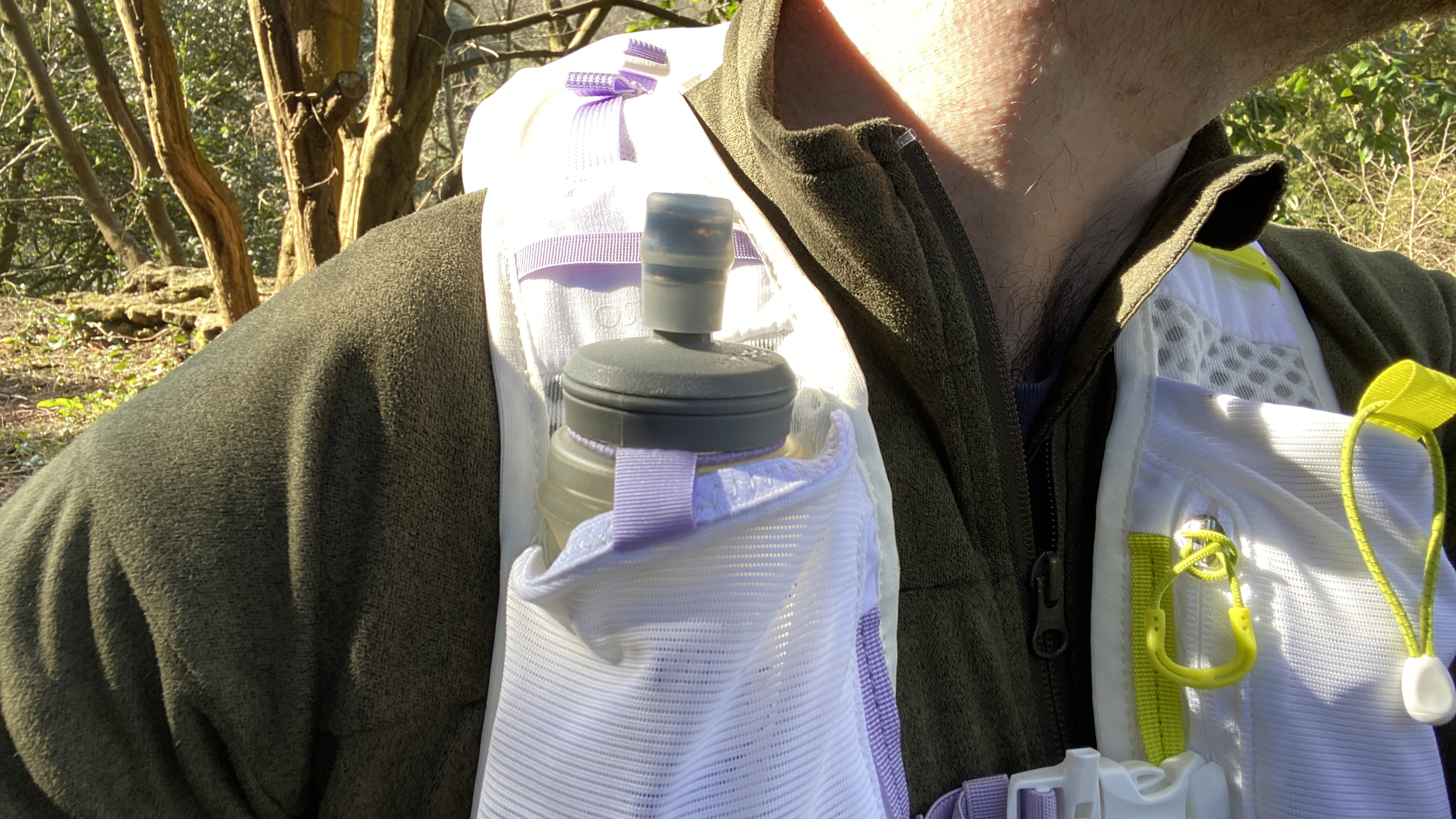
A Velcro panel allows the wearer to adjust the height of the harness easily and quickly for maximum comfort. There’s a holey spacer mesh – a hexagonal foam structure – on the straps and hipbelt that provides cushioning without sacrificing breathability. Its appearance puts me in mind of honeycomb. The tightening system pulls both ends of the hipbelt into the body, which enhances stability on rugged trails.
Ventilation is critical for a pack designed for sweaty exploits like mountainous trail running. The suspension system comprises a mesh sheet that sits in front of an EVA foam backpanel, while an Atilon polyethylene foam framesheet wraps around the body, providing load transfer without unduly compromising breathability.
Beyond the back panel is space for a hydration bladder with the usual clip to make it fully compatible with Osprey’s reservoirs. Along with the soft flask spaces, you can easily carry around 3 liters at a time, making this a useful hydration pack to have on your side for longer adventure races.
Storage for fast and light exploits
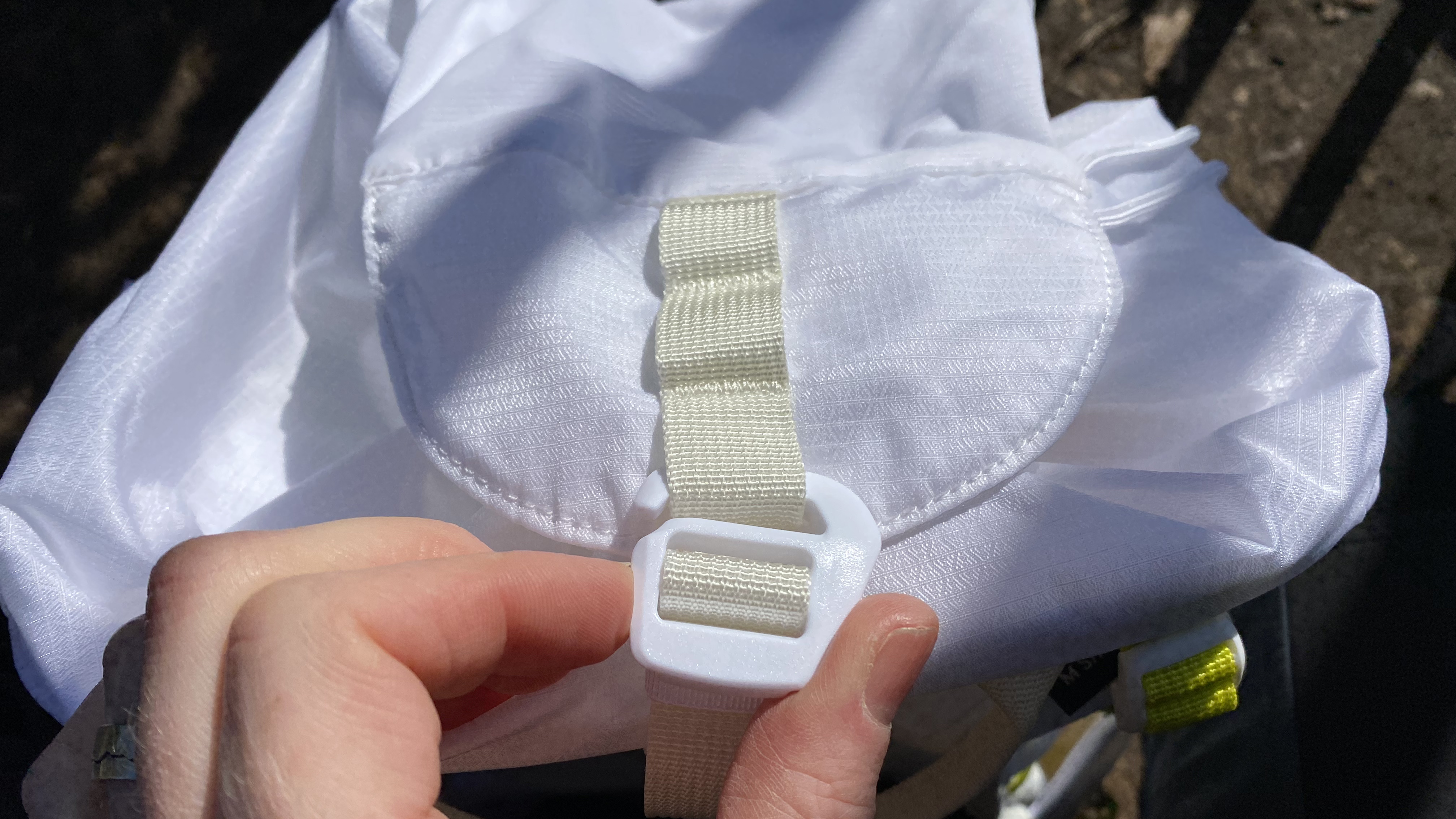
The main compartment is relatively unfussy, with an internal mesh zippered pocket with key clip and drawstring closure. It’s secured via a top-cinch that allows the wearer to compress the pack as much as needed. If you wanted to use the Talon Velocity as a climbing or cycling pack, the stretchy front mesh pocket has enough give to wrap over a helmet, holding it in place at the top of the pack.
Both sides of the pack hold large elasticated mesh pockets with dual access, from the top and from the side. Twin compression straps allow you to cinch whatever you place in here to make it more secure or attach items externally.
For further secure storage of items, there’s a small, zippered pocket on the right hip belt and a less secure but useful open mesh stash pocket on the left. The front of the pack features lightweight trekking pole or ice axe attachments, while poles can also be stowed to the side between elasticated loops on the left hip belt and the bottom of the left harness strap.
There’s no waterproof cover, which I approve of whole heartedly, as internal dry bags are a far better option. Standard waterproof backpack covers have a tendency to blow off, littering our wild places.
On the trails
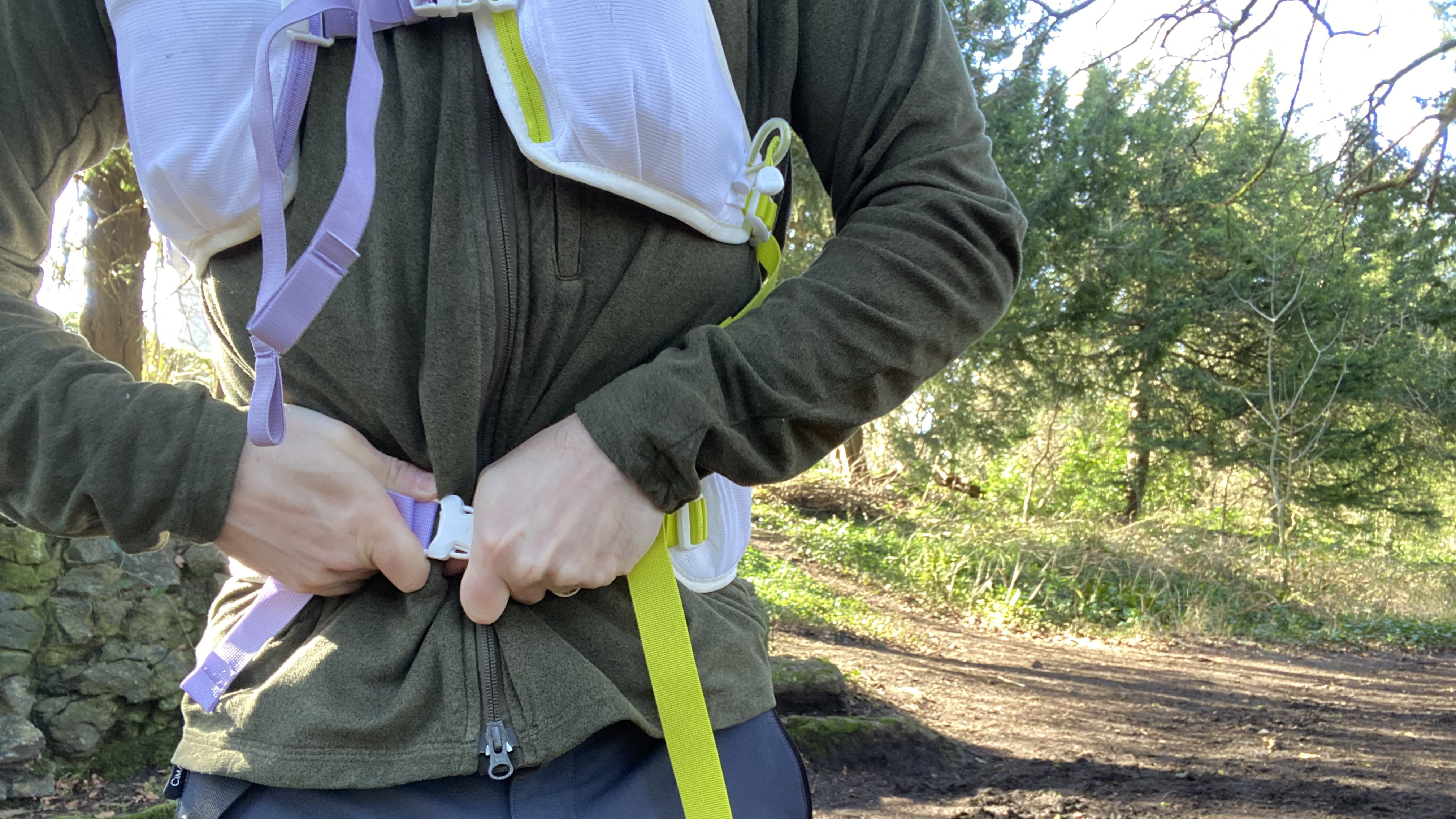
I wore the Talon Velocity on hikes and runs in England’s West Country and South Wales’ Bannau Brycheiniog (Brecon Beacons) National Park during early spring. As expected, once I’d made all the appropriate adjustments, it was a comfortable little daypack to carry, both at speed and when taking things a little slower. When running, it moved with me, thanks to the way the fit can be tailored by the various straps. The mesh backpanel provided the required ventilation on warmer days, enhancing the overall comfort levels.
The versatility of the Talon Velocity is its main selling point. Other than winter walking, mountaineering or wild camping expeditions, there’s no activity that I’d do that it doesn’t have covered. Plus, the 30-liter version would be a decent option for one night backcountry camps, especially with its dedicated sleeping pad attachments straps, though my 20-liter version lacks the capacity and features.
I personally love having soft flasks immediately to hand for both long runs and faster hikes. The approach is my preferred option to a hydration bladder, or bulkier water bottles. When I’m running, it’s also handy to have my phone in such an easily accessible yet secure space. When taking photos or using a navigation app, quick access is far preferable to having to take a pack off every time to grab my phone.
Alex is a freelance adventure writer and mountain leader with an insatiable passion for the mountains. A Cumbrian born and bred, his native English Lake District has a special place in his heart, though he is at least equally happy in North Wales, the Scottish Highlands or the European Alps. Through his hiking, mountaineering, climbing and trail running adventures, Alex aims to inspire others to get outdoors. He's the former President of the London Mountaineering Club, is training to become a winter mountain leader, looking to finally finish bagging all the Wainwright fells of the Lake District and is always keen to head to the 4,000-meter peaks of the Alps. www.alexfoxfield.com
